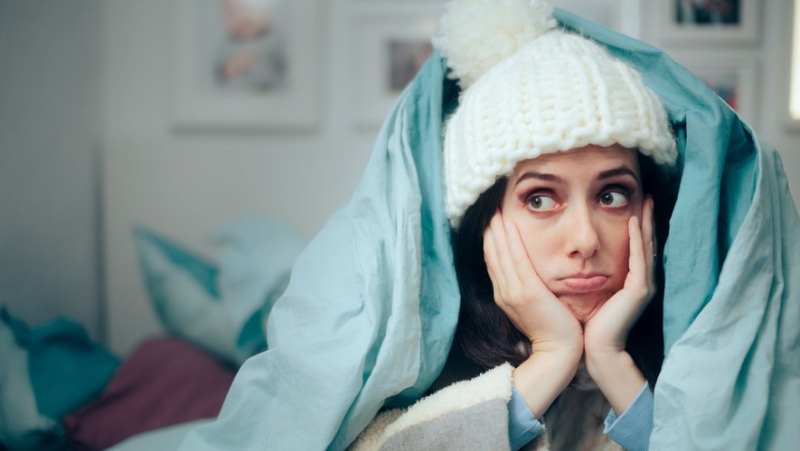Exceptional cold snap: ventilate, cover up, eat healthy… how to preserve your health during this episode ?

It is recommended not to overheat your home, and to wear multiple layers of clothing indoors, to cope with episodes of extreme cold. nicoletaionescu/Getty Images
What consequences can the cold have on health ? If freezing temperatures can lead to an increase in certain infectious diseases, it is the habits adopted during these episodes of extreme cold that can prove to be the most harmful to health.
Fortunately, there are simple reflexes to adopt to stay in shape when temperatures plummet. Here are three to implement throughout the winter.
Negative temperatures, snow, ice: a major part of France is affected by a "persistent episode of cold", with a peak expected on Tuesday, as indicated by Météo France. A drop in mercury which is not without consequences for the body.
More than the cold itself, certain changes in behavior could be particularly harmful to your health, whether you stay at home or go out, therefore requiring great vigilance. Ventilating your home or workplace, eating a balanced diet, covering yourself, or even maintaining a regular (but not intense) level of physical activity are all reflexes to adopt to protect yourself from the direct and indirect consequences of such episodes of cold.
Ventilate (and not overheat) your home
Contrary to popular belief, it is necessary, if not essential, to ventilate your home in winter, as often as possible. The best is to open the windows in the morning and/or evening, in sequences of 5 to 10 minutes, to allow the home to be cleaned by renewing the air – and get rid of dust, humidity, mites, and other pollutants that can cause allergies or breathing difficulties.
As Public Health France and Health Insurance regularly remind us, it is also essential to properly maintain and not obstruct the air vents, which also contribute to good air renewal, and maintain the temperature of the home around 19 degrees – without overheating.
Please note, cold spells are even more likely to cause carbon monoxide poisoning. You must be vigilant regarding the use of certain appliances, such as auxiliary or combustion heaters, and the absence – or deficiency – of ventilation in the room in which This type of device is placed.
Cover yourself to avoid hypothermia
Who says episode of extreme cold, does not say hibernation – especially if the latter takes place over time. It is obviously necessary to limit physical exertion and movement, but it is still recommended to go out for a few minutes a day to freshen up the body and mind.
To do this, you must prepare to face the cold to reduce the risk of hypothermia (when the body temperature drops below 35 degrees), as advised by Public Health France. This involves covering the extremities which lose heat more quickly (head, hands, feet, neck), but also the nose and mouth using a scarf to breathe. less cold air, multiply layers of clothing, including a final one that is windproof and waterproof, and choose a suitable pair of shoes to avoid slipping in the event of snow or ice.
It is also recommended to avoid going out in the evening or at night, to avoid going out for too long, and to stay active outdoors by walking (no intense physical effort).
Do not change your diet
"With this cold, what's better than a good raclette ?". It's impossible not to have heard this kind of rejoicing before, if you haven't said it yourself. While it is not harmful to your health to succumb to this type of food in the middle of winter, it is important not to eat too many meals that are too rich or too copious, as health authorities point out.
Health Insurance indicates: “It is important to maintain a balanced diet that provides all the necessary nutrients. The body expends very few additional calories during extreme cold, which is why you should not eat more in winter. It is therefore, as for the rest of the year, to favor fruits and vegetables, legumes, nuts, homemade, wholemeal pasta and rice, fatty fish. and lean, and certain vegetable oils.
The French organization also encourages the consumption of honey for its antibacterial properties, and to hydrate well by consuming water and hot drinks. Please note, contrary to popular belief, alcohol does not warm you up, and can be particularly harmful during such cold episodes.
Be careful, the drop in temperatures is particularly harmful for sensitive and fragile people, starting with children and the elderly. It is therefore appropriate to pay particular attention to this audience, but not only.
This is also the case for athletes and people working outdoors, as well as people said to be at risk, suffering in particular from cardiovascular, respiratory, or endocrine diseases, Raynaud's syndrome, obstructive pulmonary disease (COPD) or asthma attacks. Homeless people are the most exposed to the cold, so it is essential to be vigilant and call 115 if you encounter someone in difficulty.




